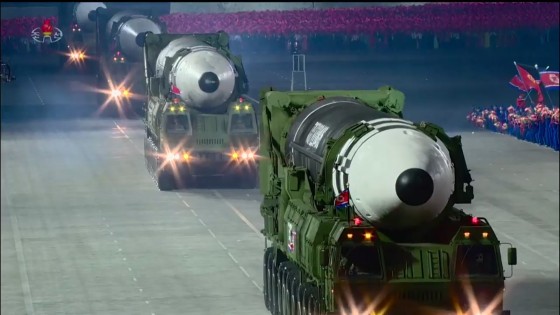SEOUL, South Korea — North Korean leader Kim Jong Un warned Saturday that his country would "fully mobilize" its nuclear force if threatened, as he took center stage at a massive military parade to mark the 75th anniversary of the country's ruling party.
He also unveiled what appeared to be a new intercontinental ballistic missile in the country's growing weapons arsenal.
Kim avoided direct criticism of Washington during the event, which took place less than four weeks before the U.S. presidential election. Instead, he focused on a domestic message urging his people to remain firm in face of "tremendous challenges" posed by the coronavirus pandemic and crippling U.S.-led sanctions over his nuclear program.
Kim described the North’s continuing efforts to develop its nuclear deterrent as necessary for its defense and said it wasn't targeting any specific country with its military force.
But "if any force harms the safety of our nation, we will fully mobilize the strongest offensive might in a pre-emptive manner to punish them," he said.
His speech was punctuated by thousands of goose-stepping troops, tanks, armored vehicles, rocket launchers and a broad range of ballistic missiles rolled out in Pyongyang's Kim Il Sung Square.
The weapons included what was possibly the North's biggest-yet ICBM, which was mounted on an 11-axel launch vehicle that was also seen for the first time. And a presumptive new solid-fuel weapon that could be an advanced version of a North Korean missile, designed to be fired from submarines.
The display highlighted how the North has continued to expand its military capabilities, amid a stalemate in nuclear negotiations with the Trump administration.
South Korea's Joint Chiefs of Staff said early in the day that there were signs that the North had mobilized "large crowds and equipment" for a military parade at Pyongyang's Kim Il Sung Square during the early morning hours. In the evening, North Korean state television began airing a taped broadcast of the event, which began late Friday.
Performers and tens of thousands of spectators roared as Kim, dressed in a gray suit and tie, appeared from a building as the clock struck midnight.
Kim, flanked with senior officials and smiling widely, waved to the crowd and kissed children who presented him with flowers before taking his spot on the podium.
During his speech, Kim repeatedly thanked his "great people" for overcoming "unexpected" burdens and abiding by the anti-virus measures imposed by the ruling party to keep the country Covid-19-free — a claim that has been widely questioned by outside observers.
He also extended an olive branch to rival South Korea, expressing hope that the countries could repair bilateral ties once the threat of the pandemic is over.
Download the NBC News app for breaking news and politics
After his speech, Kim waved and watched with binoculars as the military hardware was rolled out in the square. He saluted as fighter jets flew in formation above head, using fireworks to form the Workers' Party's symbol — a hammer, brush and sickle — and the number 75 in the sky.
Earlier Saturday, masked citizens lined up to lay flowers at the statues of Kim Il Sung and Kim Jong Il, the father of the current ruler, at Pyongyang's Mansu Hill.
The North's official Korean Central News Agency said residents in Kaesong and other regions who had lost their homes to recent floods and natural disasters, marked the party anniversary by moving into newly built houses and that they praised Kim Jong Un for looking after them as "their father."
KCNA also reported that Chinese President Xi Jinping had sent a letter to Kim saying that Beijing would continue to "defend, consolidate and develop" bilateral relations with Pyongyang.
This year's anniversary comes amid deadlocked nuclear negotiations with the Trump administration and deepening economic woes, that analysts say are shaping up as one of the biggest tests of Kim's leadership since he took power in 2011.
Many believe North Korea will avoid serious negotiations or provocations before the U.S. presidential election in November, as a change in U.S. administrations could force the country to recalibrate its approach toward Washington and Seoul.

